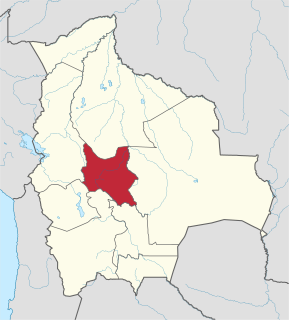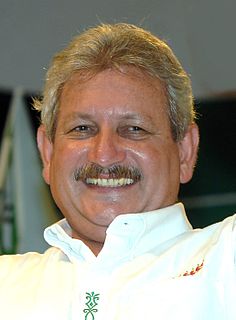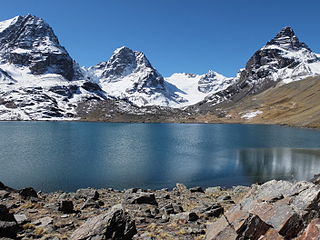
The politics of Bolivia takes place in a framework of a presidential representative democratic republic, whereby the president is head of state, head of government and head of a diverse multi-party system. Executive power is exercised by the government. Legislative power is vested in both the government and the two chambers of parliament. Both the Judiciary and the electoral branch are independent of the executive and the legislature. After the 2014 election, 53.1% of the seats in national parliament were held by women, a higher proportion of women than that of the population.

Cochabamba, from Quechua qucha or qhucha, meaning "lake", pampa meaning "plain", is one of the nine departments of Bolivia. It is known to be the "granary" of the country because of its variety of agricultural products from its geographical position. It has an area of 55,631 km². Its population in the 2012 census was 1,758,143. Its capital is the city of Cochabamba, known as the "City of Eternal Spring" and "The Garden City" because of its spring-like temperatures all year.

Elections in Bolivia gives information on elections and election results in Bolivia.

The Movement for Socialism–Political Instrument for the Sovereignty of the Peoples, alternately referred to as "Movement Toward Socialism" or "Movement to Socialism", is a Bolivian left-wing socialist political movement led by Evo Morales, founded in 1998. Its followers are known as masistas.

General elections were held in Bolivia on 18 December 2005. Evo Morales of the Movement for Socialism (MAS) party was elected President of Bolivia with 54% of the vote, the first time a candidate had received an absolute majority since the flawed 1978 elections. Morales was sworn in on 22 January 2006 for a five-year term. The MAS also won a majority of seats in the Chamber of Deputies and emerged as the largest party in the Senate.

A constitutional referendum was held in Bolivia on 25 January 2009, postponed from the initially planned dates of 4 May 2008 and then 7 December 2008. Drafted by the Constituent Assembly in 2007, the new constitution was approved in the referendum according to an exit poll by Ipsos Apoyo for La Razón and ATB, a Bolivian television network. Furthermore, it required early elections to be held on 6 December 2009.

Rubén Armando Costas Aguilera is a Bolivian politician and the current governor of Bolivia's Santa Cruz department for the Truth and Social Democracy (VERDES) party. In 2013, he founded the Social Democrat Movement party to participate in the 2014 presidential and parliamentary election. Previously he served as prefect on behalf of the Autonomy for Bolivia party. He was one of the nine Bolivian prefects directly elected in the general elections of 2005. This election was the result of several negotiations and large, peaceful public demonstrations in Santa Cruz. The 1967 Bolivian constitution said that prefects can only be appointed by the president, but because of the negotiations and popular desire, the Bolivian Congress approved Law 3015 to formalize the prefect election process.
Social unrest in Cochabamba involved violent clashes between supporters and opponents of Cochabamba Prefect Manfred Reyes Villa in the departmental capital city of Cochabamba, Bolivia, reaching their peak on January 11 and 12, 2007. The policies of the President Evo Morales and the agenda of his Movement towards Socialism (MAS) party in the Constituent Assembly were opposed by politicians in other political parties, notably Reyes Villa. The prefect's opposition to Morales' policies angered the President's supporters, and early in 2007 demonstrations in Cochabamba escalated into violent clashes between Reyes Villa's civic movement and urban and rural social movements who called for his ouster. During the violence, coca farmer Juan Tica Colque and the young student Christian Urresti (17) were killed. Coca farmer Luciano Colque (48) was mortally wounded by blows from civic movement protesters and died of cranial trauma on February 27. Some 200 people were wounded in the clashes.

The Media Luna or Media Luna Ampliada refers to a group of four departments – Santa Cruz, Beni, Pando, and Tarija – in Bolivia which became the geographic area of opposition to the national government led by Evo Morales and the Movement for Socialism (MAS).

The Bolivian Constituent Assembly, convened on August 6, 2006 in Sucre, with the purpose of drafting a new national constitution by December 14, 2007; extended from the original deadline of August 6, 2007. The Assembly approved the new Political Constitution of the State on 9 December 2007. It was put to a national referendum held on 25 January 2009, and went into force on 7 February 2009.

The 2008 unrest in Bolivia began with protests against President Evo Morales and calls for greater autonomy for the country's eastern departments. Demonstrators escalated the protests by seizing natural gas infrastructure and government buildings. Violence between supporters of Morales and opponents resulted in at least 30 deaths.
Leopoldo Fernández Ferreira is a Bolivian politician. A member of Social and Democratic Power (PODEMOS) Fernández was Prefect (Governor) of the northern Bolivian department of Pando from 2006 to 2008.

The Bolivian general election, 2009 was held on December 6, 2009, following a constitutional referendum held on 25 January 2009. Voters elected:
The history of Bolivia since 1982 begins with the restorations of democracy after the rule of the military junta of 1982. Evo Morales has held the presidency since 2006. A new constitution was enacted in 2009. Bolivia's population has roughly doubled over this period, from 5 million in 1980 to 10 million as of 2012.
The Porvenir massacre was a deadly ambush in the early hours of September 11, 2008, allegedly organized by Prefectural authorities of the Bolivian Department of Pando, as part of a civil coup d'état against the government of Evo Morales by members of the right-wing civic movement. As a result of the ambush, at least 12 indigenous protesters of the municipality of El Porvenir died that day.
Esteban Urquizu Cuéllar is a peasant leader, governor of Chuquisaca, and the youngest governor in Bolivia. He is affiliated with the Movement for Socialism (MAS), for which he previously served as a member of the Constituent Assembly. He won the 2010 gubernatorial election in Chuquisaca with 53.6% of the vote. Previously, he led the Chuquisaca Peasant Worker Federation. His wife is Alejandra Picha and former Prefect of Chuquisaca. Savina Cuéllar is his aunt.

The Presidency of Evo Morales began on January 22, 2006 when Evo Morales was inaugurated as the 80th President of Bolivia, following his victory in the 2005 general election, where he won 53.7% of the vote, defeating Jorge Quiroga, Samuel Doria Medina, and several other candidates. Morales increased taxation on the hydrocarbon industry to bolster social spending, emphasising projects to combat illiteracy, poverty, racism, and sexism. Vocally criticizing neoliberalism and reducing Bolivia's dependence on the World Bank and International Monetary Fund, his administration oversaw strong economic growth while following a policy termed "Evonomics" which sought to move from a liberal economic approach to a mixed economy. Scaling back U.S. influence in the country, he built relationships with leftist governments in the Latin American pink tide and signed Bolivia into the Bolivarian Alliance for the Americas. Attempting to moderate the left-indigenous activist community, his administration also opposed the right-wing autonomist demands of Bolivia's eastern provinces. Winning a recall referendum in 2008, he instituted a new constitution that established Bolivia as a plurinational state and was re-elected in 2009. His second term witnessed the continuation of leftist policies and Bolivia's joining of the Bank of the South and Community of Latin American and Caribbean States; he was again reelected in the 2014 general election.

A constitutional referendum was held in Bolivia on Sunday, 21 February 2016. The proposed constitutional amendments would have allowed the president and vice president to run for a third consecutive term under the 2009 Constitution. The referendum was voted down by a 51.3% majority.














